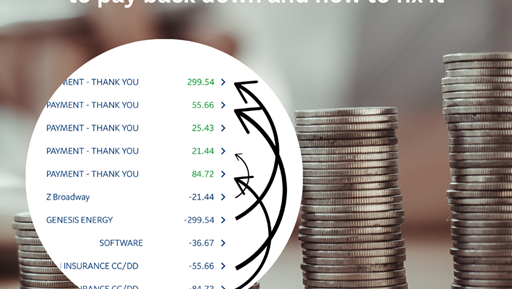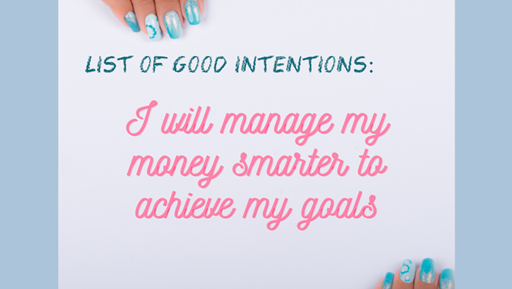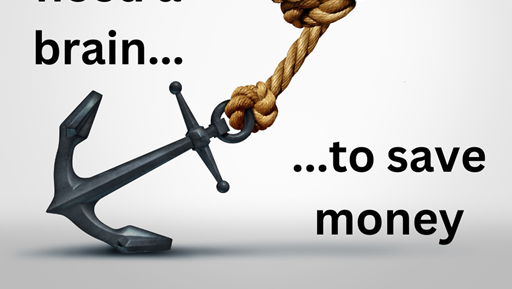
5 Credit Card Risks Every Smart Spender Needs to Know
The 5 Biggest Risks of Putting All Your Expenses on a Credit Card Using a credit card for all your expenses can be a smart way to manage your finances, earn rewards, and build credit—if done responsibly. However, relying solely on credit cards with the plan to pay off the balance in full at the end of the month comes with risks. Here are the five biggest pitfalls to consider:1. Overestimating Your Ability to Repay in Full Relying entirely on your credit card often results in underestimating how much you’ve spent throughout the month due to the number of small purchases and transactions you make. These can add up a lot quicker than you realise. Larger unexpected expenses, like medical bills or car repairs, can sabotage your ability to pay the balance in full and once you roll over into the following month with a balance, the high interest rates on credit cards make paying off the debt much harder than anticipated. For many people the reason this occurs is that they have built the habit of paying for their expenses ahead of actually earning the money so there is no other way to pay for current expenses except with the credit card. Solution: Set yourself a weekly spending review to monitor your balance and what you spent that week. Knowing what you have spent already helps you think a little more strategically about where you might be able to reduce spending in the week that follows. 2. Falling into the “Revolving Credit Trap” Credit card companies remain profitable because the majority of people at some point become indebted to the stage that they can now only pay the minimum balance each month. You are now caught in the revolving credit trap, where you’re only making small dents in your balance while paying significant interest. Solution: Have a budget or plan that identifies clearly for you how much your expenses are each month and then reduce your card limit to reflect this amount. That way you remove the risk of becoming over indebted. Ensure you are building an emergency fund as part of your financial plan. Then if any larger unexpected expenses occur you can immediately move funds from your emergency savings account onto your credit card to avoid becoming stuck in debt. 3. Increased Risk to Fraud While credit cards often come with fraud protection, challenging any charges you know you didn’t make can be both stressful and costly. Especially if a significant amount of your available credit has now disappeared while you try and get the transactions investigated and resolved and you are in that cycle of needing the money to pay your ongoing expenses. Solution: Review your credit card statements weekly for unauthorised charges. Set up real-time transaction alerts to monitor activity. 4. Letting Rewards and Benefits drive your spending behaviour Credit card rewards can be attractive, but chasing points, miles, or cashback often leads to unnecessary spending. You rationalise your purchases as a good thing ultimately costing you more than the value of the rewards. Solution: Accept rewards as a bonus, not a spending motivator. Your spending should always be in line with what you have to spend anyway and therefore any rewards were simply a consequence of that. 5. Dependence on Credit for Lifestyle Maintenance Relying purely on a credit card creates a dangerous habit of living beyond your means. At the point your spending exceeds your income and you are now depending on credit to maintain your lifestyle, it’s only a matter of time before you find you have entered a season of debt dependency. This then creates financial stress and leads to long-term financial instability. Solution: Only use your credit card for reoccurring fixed expenses like utilities and insurances and develop the habit of using your own money or cash for discretionary spending which will help you reinforce good spending habits and be more mindful of how much you are actually spending through the course of a month. A Timely Reminder Credit cards offer convenience and rewards however they require disciplined management. Being aware of these risks and implementing strategies that can help you avoid the financial pain that follows when you haven't actively managed your credit card isn’t an overnight success. It requires a clear plan and an even more disciplined approach to get out of debt than what you would have needed to apply in order to avoid it in the first place. If you want to create a plan to get your credit card back to where it should be and avoid the additional interest it is costing you, you can use this handy calculator to work out a payment strategy. Or if you prefer, you can always reach out for some personal support, just schedule a Free Discovery Call and we can explore how I can help.

Why we struggle to save money
Join me in a conversation. For anonymity I will call you Alex. Alex: (sipping coffee) You know, Tony, I’ve been trying to figure out why it feels so hard to save money. I mean, I have a decent income, but it feels like I’m constantly running in circles. Tony: (nodding) Trust me, you’re not alone. It’s not just about how much you earn—it’s how banks and companies have designed the system. Honestly, a lot of it comes down to how they profit from our lack of understanding and subconscious spending habits. Alex: (frowning) Lack of understanding? What do you mean? Tony: Think about it. Banks make most of their money through fees and interest. Overdraft fees, late payment penalties, credit card interest—those things add up. And who’s most likely to fall into that trap? People who don’t fully understand how money works or don’t have a solid financial strategy. Alex: (leaning in) Okay, but how do they get us? Tony: Marketing. Clever, psychological marketing. Ever notice how we are constantly bombarded with options of credit cards with rewards programs or offer “buy now, pay later” plans? They know the truth that most people won’t pay off their balance in full every month and those that do only ever do for a short period of time before they too find themselves carrying a balance, now stuck paying them interest—sometimes upwards of 20% or more. Alex: (surprised) Wow. So, they’re profiting off our bad habits? Tony: Exactly. And it goes deeper. Millions of dollars are continually spent by companies studying human behaviour. They know we’re emotional creatures. That’s why you see ads that make you feel like you deserve that new outfit or the latest gadget. They tap into our desire for instant gratification. Alex: (sighing) And then we swipe the card or sign another loan agreement without thinking about the long-term consequences. Tony: Yep. And banks count on that. I think the most subtle and expensive trap is how they rarely ever talk about how they will help you pay off your mortgage sooner they just hope the financial pressure you are feeling will cause you to make one of the most costly mistakes which is to refinance. They wave under your nose a lower interest rate. And most people take the bait when the interest rate has nothing to do with helping them get out of debt sooner. Alex: (thinking) And here I thought they were just being helpful. Tony: (laughs) They’re helping themselves, not you. The truth is, it’s a cycle. You spend without planning, end up with debt, and then feel stuck because the system keeps you there. Alex: So, how do we break free? Tony: First, awareness. Understand the game being played. Banks and businesses aren’t evil—they’re just doing what they’re designed to do: make a profit. But you don’t have to play their game. Alex: (curious) What’s the alternative? Tony: Learning to understand the system and manage your money smarter. Once you start doing this the right way, then tracking your expenses starts to pay off. Having a clear budget and plan goes past the numbers and actually starts to make a financial difference that you can benefit from. People I coach normally have the start of their emergency fund in place in a matter of weeks so they can become less reliant on credit when unexpected costs come up. Alex: (nodding) That makes sense. Tony: Also, be mindful of emotional spending. Before buying something, ask yourself: Do I really need this, or am I just trying to feel better about something? Alex: (smiling) Wow, Tony you should write a book or something. Tony: (grinning) Funny you say that. I did. Helping people like you understand this stuff makes a huge difference to their lives. Alex: This chat’s really got me thinking, I need to get a copy of your book and get out of this cycle I have been stuck in for far too long now. Tony: That’s a great starting step Alex, investing in yourself is one of the best investments you will ever make. Alex: Thanks, Tony. Tony: Anytime. Hey quick question, I noticed when you bought your coffee you waved your card over the terminal to pay, why did you do that? Alex: It just keeps life simple. Tony: So you know what we talked about? Habits and human behaviour. Did you know Covid had us start behaving that way, contactless payments we adopted out of the promotion of the benefits amidst a pandemic. And it made sense. But here’s the thing, in the beginning it didn’t cost you anything to pay this way. Alex: Oh yeah I’m aware we pay now, but it’s very little so for the convenience I don’t mind. Tony: Really? Have you stopped to calculate what it actually costs you? I’ve worked it out and the average person is paying close to $1,200 a year on these fees. That’s $100 a month you could get back starting today if the only change you made was to switch off payWave and start taking a moment to punch your pin number in instead. What’s could you do with an extra $1,200 a year? Enjoy the book, and you know how to find me if you want some help fast tracking your progress and understanding what other simple changes would benefit you personally. Alex: Thanks Tony, I’m starting to understand why your clients speak so highly of you. This short conversation has already made a huge difference. Check out my book here

What is intentional money management?
Have you ever taken a moment to stop and think how intentional you are about managing your money? Intentional money management is about making thoughtful and deliberate choices that align with one’s financial goals, values, and long-term vision. It's about taking control of spending, saving, and investing habits, and being mindful of how they impact on an individual’s financial well-being. Managing your finances intentionally means regularly reflecting on your spending habits and financial decisions, and prioritizing what's most important to you. Instead of reacting impulsively to expenses or financial demands, you're proactive in creating a plan that helps you achieve the financial life you desire. A key benefit of intentional money management and possibly the most important one is that it brings clarity and focus to your financial life. When you know what your financial goals are and why they matter, making decisions about how to use your money becomes easier. This sense of direction can lead to a more purposeful and satisfying financial journey. Intentional money management also helps you cut out unnecessary expenses and distractions, allowing you to focus on what truly matters financially. By being mindful of where your money goes, you can prioritize spending on things that bring value and joy, and let go of expenses that don't align with your goals. Another benefit is that it can improve your overall financial well-being and peace of mind. When your spending, saving, and investing align with your values and goals, you'll likely feel more content and confident in your financial decisions. Being in control of your finances can also reduce stress and boost your sense of accomplishment. It can positively impact your relationships as well. When you're clear about your financial priorities and boundaries, you can communicate them more effectively, leading to healthier financial interactions with others. This clarity can also increase your self-confidence and financial independence. It's important to remember that intentional money management isn't about being perfect or never making mistakes. It's about being mindful of your financial choices and adjusting when needed. Living intentionally with your money means avoiding autopilot mode one of the key principles I cover in my book ‘How I fixed my Broken Budget – 7 key principles for successful budgeting’ and staying aware of how your financial decisions affect your life. If you are new to intentional money management start by understanding your current financial expenses and where your money goes then next set clear financial goals and create a plan to achieve them by removing areas of spending that don’t provide you value and will sabotage your goals if they remain part of your spending pattern and habits. Take time to reflect on your financial habits, track your spending, and consider how your financial choices align with your goals. This practice can increase your financial clarity and help you make more informed decisions. I call this monitoring your behaviour not the money In conclusion, intentional money management is about making conscious and deliberate financial choices that align with your values, goals, and vision for your life. It can bring clarity, focus, and financial well-being, as well as healthier relationships and peace of mind. If this resonates with you and seems like the direction you have been looking for but getting started is an obstacle, then consider investing in yourself and completing a ‘Money Mentor Program’ or grab a copy of my book and go it alone. Either way you owe it to yourself to do something. Your future self will thank you for it. Start your journey today towards a healthier and enjoyable financial future.

Is refinancing my mortgage the best decision?
Refinancing your mortgage might seem like a great option but for many people it’s actually not. We all have those hindsight moments in life right, I will never forget that moment for a couple I met just after the GFC. Their hindsight moment was realising that the true cost for them from the previous two decisions to refinance was just shy of $600,000. It’s a costly mistake that anyone can make. This article covers some key questions to ask yourself before you head down the refinance decision so you can avoid costly mistakes and be confident in your choice whether that’s to refinance or stay with your current lender. Here’s five questions worth asking yourself when evaluating if refinancing is the best option for you.

Are finances sucking the life out of you?
Have you secured your oxygen mask? Imagine you're on an airplane, and the flight attendant begins the safety demonstration. Among the instructions, they emphasize the importance of securing your oxygen mask before helping others with theirs. This simple guideline carries a profound lesson applicable beyond air travel—it's also a great metaphor for prioritising your financial health before indulging in non-essential expenses. Much like ensuring your own well-being before helping others during an emergency, managing your finances responsibly sets a strong foundation for long-term stability and financial well-being. Here’s how prioritising financial management mirrors putting on your oxygen mask. Self-Preservation: Securing your oxygen mask assists you to maintain consciousness and functionality in times of risk and uncertainty. Managing your personal finances with a well balanced budget or plan that includes consistently building your savings and controlling or minimizing your debt exposure, ensures your financial well-being in times of risk and uncertainty. Clarity and Focus: Wearing your mask clears your mind to focus on assisting others. Similarly, effective personal money management provides the clarity and peace of mind needed to navigate unexpected expenses or redirecting of money to other areas when situations warrant it. Surviving extreme situations: Putting on your mask gives you the oxygen you need until the pilot can get the plane to an altitude where you can breathe without it. Likewise, a well-managed budget and financial plan provides a safety net, helping you get through extreme situations like medical emergencies, incapacity to earn an income for a period of time or worse. Influences responsible behaviour: When you live a life of prioritising your finances, you set an example for others of what is helping you succeed, much like how demonstrating the oxygen mask procedure for passengers helps them understand the benefits to them if they follow the instructions. This has the potential to influence family members, friends, workmates and others in your life to also adopt healthy financial habits. Assistance to others: Just as securing your mask allows you to assist others without compromising your own safety, managing your finances responsibly ensures you can meet any expenses of supporting others or funding things you think you need to do that are right now most likely seated in a sense of obligation rather than necessity. The Importance of Financial Prioritisation Prioritising financial management before spending on unnecessary items is not about going without but rather about creating for yourself a solid foundation for both financial freedom and security. Here are some key benefits of this approach: Financial Stability: Budgeting and managing finances wisely creates stability for your finances, reducing stress and uncertainty with how much money you have or where it needs to go. Debt Reduction: Prioritising the continual management of your finances will often lead to better opportunities to tackling debts strategically and reduce the amount of debt you have which in turn can save you significant money in interest. Wealth Building: By saving and investing wisely, you build wealth over time. This opens doors for a more comfortable retirement, potential homeownership, funding education for yourself or your children, and other long-term goals. Emergency Management: A well-managed budget includes provisions for emergencies, ensuring you have resources to handle unexpected expenses without resorting to high-interest loans or increasing your mortgage and adding years to your indebtedness. Peace of Mind: Knowing you have control on your finances brings peace of mind and allows you to then turn your focus to other aspects of life without the constant financial stress. In Summary If you are not prioritising financial management and budgeting before indulging in unnecessary expenses, it’s like ignoring the importance of securing your own oxygen mask before assisting others. On a plane, people matter but to help them you need to be positioned to do so effectively and you can’t do that if you run out of oxygen. In life stuff matters too, the nice holiday, the eating out with friends, the gifts you want too lavish on those important to you but if you give all your attention to these things first at the expenses of not having your finances in order, it’s only a matter of time before these distractions suck the life and its opportunities out of you. By adopting this mindset, you not only help safeguard your own financial well-being but also better position yourself to fund the other things in life that bring satisfaction and enjoyment without the stress or risk of your bank account and resources running dry. Maybe today’s a good day to look at whether your oxygen mask is securely fitted.

How your brain helps you save money
Now that’s sounds like a click-bait title if ever I have seen one but don’t disconnect from reading just yet. As a money coach if there is one thing I have come to understand about money, it’s this: It is not about the numbers but how you do money that counts When you start the process of saving money there are several changes that begin to occur in your brain both neurological and psychological. It’s why I love my role as a money coach, it is really satisfying seeing how clients who have never been able to save money are saving money within four weeks. What is even more fascinating is how their thinking and creativity changes so rapidly too. It’s like they have just given their brain a massive jump start. There are several things that change, and I won’t go into them all here but below I have listed the five top benefits I believe occur, both mentally and monetary. Increased sense of achievement Dopamine is a chemical that gets released and commonly associated with reward and pleasure. Saving money regularly and seeing your savings grow is a practical activity which can quickly help you feel good about money, particularly if you haven’t been saving previously. This feeling of achievement releases dopamine and that feel good feeling triggers the subconscious encouragement to keep going. Establishing for yourself the right amount to start saving regularly is important. If you set yourself a savings level too high for your current situation the opposite occurs. The moment you can’t put aside the money, your brain associates this with failure and releases cortisol which contributes to a feeling of disappointment. That’s why you will often hear people say “Just start small with a few dollars a week” Here’s a link to a calculator you can use if you want to work out your achievable minimum savings capacity. Establishment of good habits Every time you add to your savings you are reinforcing a loop in your brain. While it might feel hard at the beginning and need a lot of focus, over time this looping effect is triggering activity in the basal ganglia, the area in your brain that is involved in the development of motor skills and habit formation. Just like anything you do that is new, start working out at the gym, learning to drive, it gets easier over time the more frequently you repeat it. Stress and anxiety levels reduce Remember that hormone I mentioned earlier, cortisol. Research suggests that saving regularly and having a savings buffer reduces the level of cortisol that gets released. The lowering of cortisol and the increase in dopamine and endorphins from saving makes an excellent combination for improving your cognitive abilities and decision making. Making better decisions with your finances and becoming less reactive to financial pressures because of now having a savings buffer then reduces the feelings of stress and anxiety. Like I mentioned earlier, it’s not about how much money you have but how you do money that makes the difference. The impossible becomes possible If you don’t have savings or aren’t contributing to building regular savings, then chances are you don’t have too much expectation or direction for the future. Life is possibly more about existence, getting from one pay-check to the next. Saving money regularly starts to provide direction and opportunities. There is no point saving for the sake of saving but until you get the process into momentum it is impossible to see a brighter future. That idea of owning a home, taking a family vacation or whatever it might look like for you just can’t be seen as reality. Saving causes you to become more mindful of what the future could look like. As you start thinking differently your prefrontal cortex kicks into action which is the part of the brain that works on planning and execution, helps with your decision making process and also starts to make positive changes towards impulsive decisions. For anyone who considers themselves impulsive when it comes to finances, saving money regularly I believe is the key to overcoming this not determination or will power. These days when I coach clients, I refer to this process as ‘Training the brain’ Knowledge becomes action We live in a world of information overload. You can google how to be better with money or any other topic you desire and instantly become drowned in opinion and information. It is only when that knowledge is put into action that change occurs however like I mentioned earlier, you are going to flood you brain with cortisol becoming increasingly disillusioned and demotivated if that knowledge isn’t applicable for your situation and fails. However, if you start saving and allow yourself to go through the process of change, you can avoid that risk as you become more knowledgeable about money, finances, budgeting, investing and planning and increase your financial literacy through learning as you save. Again, your brain actively involved, this time your hippocampus. This is the area responsible for learning and memory and as you retain what you are learning without being impulsive or reactive to your financial situation, you become more discerning about what might be the right action for you to take. I term this as 'Making smarter money decisions' Are you using your brain to it's fullest potential? So as you can see, anyone with a brain can save money and do it consistently, and saving money is a foundation stone in the process of rewiring the brain to influence not how much you earn but how you do money. How you do money is the key. If you have read this far, don’t stop here, you read this far because you’re interested in a brighter future financially. If you want to explore how I can help you retrain your brain and enjoy a brighter future I am just a phone call away or perhaps start with grabbing a copy of my book. The key to a brighter future just needs you to take one step at a time.